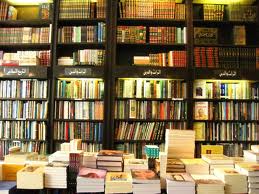Which Books ‘Should’ Be Translated from Arabic to English?
 The recent Literature Across Frontiers (LAF) report on Arabic-English translation (1990-2010) tackles the question of what should be translated. Many translators complain, in this report as elsewhere, that English-language publishers are on the lookout for sensational books that reinforce readers’ stereotypes rather than complexifying our worldviews.
The recent Literature Across Frontiers (LAF) report on Arabic-English translation (1990-2010) tackles the question of what should be translated. Many translators complain, in this report as elsewhere, that English-language publishers are on the lookout for sensational books that reinforce readers’ stereotypes rather than complexifying our worldviews.
In the words of translator Alexa Firat:
Now that Arabic literature is reaching a larger audience it’s being more and more “orientalized”—terrorism and the condition of women‘s lives, catering to the interests of the general public who’re not necessarily knowledgeable about the region in terms of daily life and social conditions and cannot understand the satire, humor, narrative experimentation, etc that writers in the region employ.
And Marilyn Booth:
Of course there‘s nothing wrong with the demand for sociology in itself, but it shouldn’t be the main reason and criterion for a book being published, and too often it is. Publishers say “I’m really interested in stuff from Iraq right now,” with politics as the main impetus behind that interest.
This presumed emphasis on sensationalism, politics, and “taboo-breaking” sounds right. But a glance at recent and forthcoming releases in translation shows, if anything, an emphasis on award-winners and solid literary fiction. Recent and forthcoming translations include several books by multi-platinum award-winners like Elias Khoury, Mahmoud Darwish, Naguib Mahfouz, and Ibrahim al-Koni; a beautiful poetic work by Adania Shibli; a lovely novel by Sonallah Ibrahim; and a wonderful short-story collection by Hassan Blasim.
Yes, there are the popular Alaa al-Aswanys and Rajaa al-Saneas, and the sexy Salwa al-Neimis, but they represent the minority of authors translated from the Arabic into English.
Now, I don’t deny the publishing world’s sensationalist bent: On a visit to the U.S. last summer, I was searching library catalogues for Mahmoud Darwish, and all I could come up with was books by Nonie Darwish, author of books like Those Cruel Freedom-Haters Called me Infidel and Tried to Jihad Me!. However, Nonie has no need of translation.
Certainly, works by Anglos or Anglophones about the Arabic-writing world receive more attention than books by Arabs in translation. Perhaps attention is the rub, not translation. Many translated works sell only a few thousand copies, if that.
To attract more attention to literature in translation, it would be interesting, and perhaps beneficial, to translate more popular (“fun”) novels. This doesn’t mean novels that cater to the Western appetite for the exotic, but entertaining books, like Ghada Abdel Aal’s I Want to Get Married!
I wouldn’t put it quite like translator William Hutchins:
It is more interesting to reflect what is being published in the Arab world than to insist on only translating “the best.”
In any case, ultimately publishers will need to concern themselves with finding books their audiences will read. But better that publishers focus on finding the next Girl with the Dragon Tattoo than the next You Nasty Jihadists Called Me an Infidel and I Heart America, Whoo-hoo!

If You’re in Cairo: LAF to Present an In-depth Look at Arabic-English Translation | Arabic Literature (in English)
September 5, 2011 @ 2:56 pm
[…] Which Books ‘Should’ Be Translated from Arabic to English? […]